The Natural
One of Italian cycling's emerging talents, 23 year-old Filippo Pozzato already has 19 pro wins in...
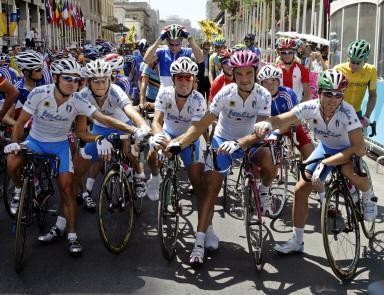
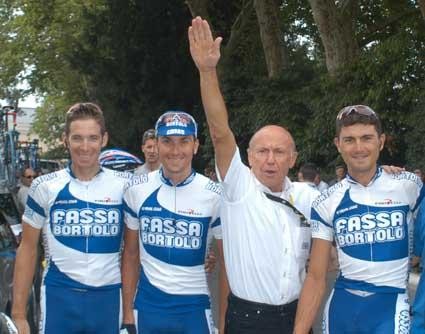
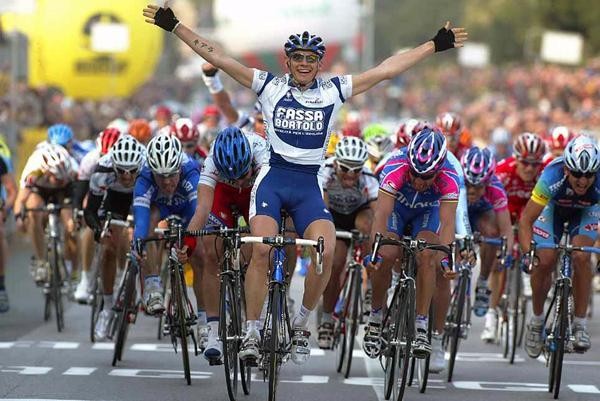
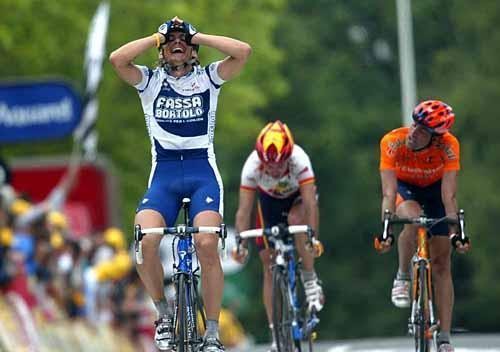
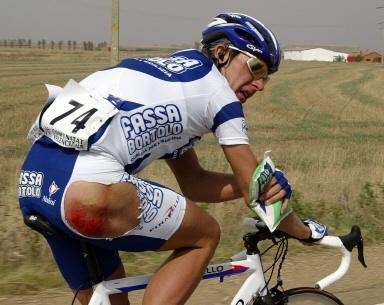
An interview with Filippo Pozzato, October 17, 2004
One of Italian cycling's emerging talents, 23 year-old Filippo Pozzato already has 19 pro wins in his five years in the cash ranks, a clear indication of his natural ability and class. But life hasn't always been easy - Cyclingnews' European Editor Tim Maloney sat down with the likeable Pippo to discuss his problems at Fassa Bortolo, his new team and life in general.
Like his friend Damiano Cunego, Italian pro cyclist Filippo Pozzato is a member of what Italian cycling aficionados call the "classe di '81"; a group of emerging young riders born in 1981. Many of these talented young riders, like Pozzato, Fabian Cancellara and Bernard Eisel, are alumni of the Mapei TT3 development team, and others, like Kolobnev and Gryschenko, are Eastern Europeans who have found a home in the pro peloton.
Pozzato has been a big talent since his junior days and after several difficult seasons at Fassa Bortolo, the powerful, rangy rider from Sandrigo showed his class and talent with a big win at the 2004 Tour de France on Stage 7 in Saint Brieuc.
When the Mapei team folded in 2002, Pozzato had enjoyed a superb year, with 14 pro wins under his belt. Signed by Fassa Bortolo, Pozzato's 2003 season started out like gangbusters, but after a crash took him out of Milano-Sanremo, the talented young rider could never seem to synch-up with the Silver Train again. 2004 went much the same for Pippo, and last month, Fassa Bortolo released Pozzato from his contract and he and teammate Guido Trenti signed with Quick.Step.
Cyclingnews: What did you think of the World Championships in Verona?
Filippo Pozzato: It was a Mondiale that was lacking the riders that everybody was expecting... I was saying that for a while before the World's. Everyone was expecting Bettini and Cunego to attack in the last two laps... up until then, everyone would go easy, for sure. So the World's was, even if it seemed hard, pretty simple. The first three riders were sprinters...then O'Grady...in the first five or six riders, there were some of the best sprinters in the world. So in the end, it seemed pretty simple. Bettini wasn't there - I think if he had been there, the race would have been different, harder for sure. He would have made the pace harder on the climbs. Too bad for Italy, but that's the way it went.
The latest race content, interviews, features, reviews and expert buying guides, direct to your inbox!
CN: It seemed like a World Championships that might have been good for you.
FP: Yeah; it was a World's that was good for my style of racing, The climb wasn't that hard, and when I'm in good form, it could have been a good race for me, but right now, I'm not. In some of the last races, I've been going well (4th in Trofeo Beghelli on September 26), but more with my legs than my head. First of all, I've been worried about getting out of my contract with Fassa Bortolo and then where I was going to race next year. I just wasn't very focused on cycling because of the other stuff. Now it's all settled and I'm relaxed; I want to get a good start in 2005.
CN: You were a member of the Italian Olympic team that supported Paolo Bettini in his gold medal ride in the road race. How did you find the experience in Athens?
FP: It was a beautiful experience for me; I really enjoyed it. The only thing that was too bad was the flu I picked up. I had a temperature and couldn't ride. It was just a flu and no sore throat or anything, but I didn't ride for almost a week. I think I had something even on the day of the Olympic road race; Bettini won, and everything went good, but I wasn't there. I wasn't riding great as I should have been that day. So I think I already had the flu that day. I still finished the race, but for the TT, I just couldn't race with my fever.
CN: So you've now obtained your release from Fassa Bortolo one year early; in any case, how would you say it went for you?
FP: Well, we've talked about how my situation was reported in the Italian cycling press; even in the World's, some journalists wrote that they were disappointed in the performance of Cunego. Why would they be disappointed? He's only 23... and they are disappointed because he didn't win? So some of these journalists are too quick to criticize, in my opinion.
As for me, I have a certain kind of personality; I say what I think. I don't know if it's good or bad. I thought I could resolve problems [with Fassa Bortolo] by talking [to the press], but that just created more problems and misunderstandings. But this situation has also given me a lot of valuable experience with dealing with the media. It wasn't all bad; I learned something from it.
In the end, my experience with [Giancarlo Ferretti, Fassa Bortolo team manager] was positive; I learned something from it. That I can't work with him... it's too bad - even this season was compromised for me by these misunderstandings. I wasn't as focused this year at the beginning of the season as I was last year. I wasn't really myself. This year, I started out strong but at the end, even if I trained a lot... at home, I was going really strong, but when I got to the races, my head wasn't in it because I wasn't relaxed and focused.
CN: Others have left Fassa Bortolo in the last few seasons because they had difficulties with Ferretti, like Roberto Damiani, your diesse at Mapei's TT3 team, who resigned in June.
FP: And not just him. There is also Stefano Zanatta [another direttore sportivo/diesse] and two team doctors. Cioni is leaving; last year, Ivanov left, as did Basso and Bartoli. Gonchar left and then was second in the Giro this year. So that says that perhaps, there is a problem there. But it's not necessarily the fault of Ferretti; I think it's like in life, when you get along with someone or you don't.
CN: So now you've turned the page and signed with Quick.Step for next year - why did you make this choice out of all the offers you had?
FP: You know, I would have even liked to stay with Damiani [ex-Fassa Bortolo diesse, with new Liquigas-Bianchi team in 2005], but I realized that Quick.Step really wanted me the most. Already last year, Quick.Step team manager [Alvaro] Crespi asked me if I was interested in riding for their team. We spoke a little before the Tour and Quick.Step said that if I was free from my contract for 2005, they wanted to talk further...
Crespi is someone who has always believed in me and that's important. So I liked that approach and I liked the idea to join a group of riders like Quick.Step. A place where I knew would feel relaxed and where people believe in me. Plus Quick.Step is certainly the strongest team for one day races, with the riders they have. There's Cristian Moreni, and Guido [Trenti]. So I think it's a really strong team with Tom Boonen, Bettini and Paolini.
CN: But one could ask why are you going to a team with so many strong riders; will you get your own room to pursue your own ambitions?
FP: Look at Mapei; we had so many big riders and we won everything. Plus everyone has a different program... look, it's a good team with a lot of strong riders. It's better to be on this kind of team than a smaller team with riders that aren't so good. So I'm ready to try this new experience.
I have no problems being on the same team as Bettini and I think for me it will be good. If I'm in front in a race in the finale, well if I'm with Petacchi, I have to work for him in the sprint. But with Bettini, I can probably have the chance to attack... if I'm there with Bettini, the others will mark him more than me. I've always had a good feeling with Bettini and also Moreni, who I've gotten to know this year as well as Paolini.
So it's kind of like I'm going home since the core of the riders at Quick.Step I know from when I rode on Mapei - Rogers, Sinkewitz, a lot of riders. And the old guard like Zanini, Bramati...that was important; the mentality of Quick.Step is like Mapei.
CN: You've just had your 23rd birthday and it's your fifth year as a pro rider; tell me about how you got involved in cycling.
FP: I started racing when I was nine. There was a little race for kids near my home in Sandrigo, Italy and it was a memorial for my uncle. He died twenty years ago and was a big cycling fan, so they started this race for him. Before starting cycling, I played roller hockey.
CN: It's a popular sport around here, isn't it?
FP: Yeah, there's a team in Bassano and Sandrigo and Breganze... so I wanted to try the race and my dad signed me up. I liked it and so I started to race bikes in the summer and play roller hockey in the winter. Eventually, my father told me to make a choice between the two sports, because otherwise I wouldn't concentrate on school. [jokes] I would have liked to just play roller hockey and ride my bike and ignore my schooling, but my Dad said no!
CN: Do you still like hockey?
FP: Oh yeah; I'd like to play sometimes too, but it's hard. I would have to practice with the Sandrigo team and they have really specific training. I'd like to see a NHL hockey game too; my fiance's father lives in Asiago, where one of the best Italian pro ice hockey teams is, and we go to a game once in a while with him. But I don't really like the violence in ice hockey; it's anti-sporting in my opinion.
CN: How old were you when you decided to focus on cycling?
FP: About thirteen or fourteen years old. You know, in Italy, cycling is pretty serious even at that age. When you get to a certain level in hockey, there's not many places you can go, but with cycling, there's a world that can provide a future for you if you're good at it. Even with roller hockey, I was on the national junior team and we went to Spain for some tournaments, but it's not the same. Cycling is much richer.
CN: So cycling was a good choice. The first time I saw you race was at the Junior World Championships in Holland in '98.
FP: Yes; I was 2nd in the road race and 3rd in the TT and in Verona [1999], I only wanted to ride the road race. Cunego won and I was 4th; everyone was marking me so I said to Damiano, 'why don't you have a go?', thinking that if he was caught, I could counterattack. However, no one could catch Cunego that day and he won.
CN: You had a big rivalry as junior rider with Damiano Cunego; the same age and from the same Veneto region.
FP: Yes, yes, he was really, really strong this year. Until last year, he wasn't going that well and had only won a few races. He's completely exploded this year...it's great for him! But outside of cycling, there's no rivalry. I was the only rider outside Cunego's [Saeco] team who was invited to the party in his hometown after the Giro. So we're real friends.
CN: So after your result in Verona in '99, Mapei asked you to turn pro at 18. What did you think? That must have been difficult for such a young rider to race in the pro ranks.
FP: For sure; at first I told myself that it would be almost impossible for me, but then, with a team structure like Mapei, I found the right people to take care of me, like Damiani, like Crespi, and they allowed me to develop as a rider without much pressure. So it became pretty easy.
I'm not saying it would be that easy for everyone; I don't want to sound stuck-up and say only I could do this. One rider can pass pro at a young age and some other might not adapt. It might be better for some if they spend some [more] time with an amateur team. Mostly, it's hard mentally. I was used to winning a lot and winning when I wanted to in the juniors and all of a sudden, I could barely finish the races! It was a complex situation for me...
CN: What was your best performance while you were on Mapei's TT3 development team?
FP: I think that perhaps my most beautiful win was the first one as a pro [at the 2002 Tour of Cuba, Pozzato won Stage 11A and the overall]. I was really looking for a pro win, even the year before I was really strong but couldn't break through. Third, fourth... after a while, it started to mess with my head. I was telling myself, 'you're really strong but you can't win, what's the matter with you'?
Then, from the beginning in 2002, I won right a stage right away in Cuba and then won the final GC there. I broke the ice and the team saw my performance and started to believe in me. I was happy with the situation and from there, everything went well. I was racing well and had a lot of wins. I wish I had been able to ride in the World Championships that Cipollini won [in Zolder, 2002]... but since I was on a TT3 team, that would have caused problems, even though Ballerini wanted me on the team.
CN: You had a great performance at the Tour de l'Avenir in 2002...
FP: That was an important race for the Mapei [TT3] team.
CN: You won two stages, including the TT and your teammate Petrov won the overall, and afterwards, you and he won the Duo Normand TT.
FP: Yeah, that went really well for me then.
CN: So after Mapei stopped at the end of 2002, you moved to Fassa Bortolo. After a great start there in 2003, with wins at Laigueglia, Giro dell'Etna and Tirreno-Adriatico in the early season.
FP: The win in Laigueglia was a big win for me, even if I had won a lot before [Pozzato had 14 wins in 2002, tied with Mario Cipollini for most wins by an Italian pro rider]. The Italian media started to write about me in a way that it was normal for me to win races like these, but it wasn't true. It was another level; I was riding there against the top riders who would give it all to win. After this win, people started to take me more seriously. Even if they might have looked down on my wins in 2002, they couldn't ignore my performances in 2003. I was beating big names like Baldato, Bettini, so I was getting to be known as a real rider in cycling.
CN: In 2003, you were a big favorite for Sanremo, and unfortunately, you crashed out. Afterwards, it seemed like something changed with your relationship at Fassa Bortolo?
FP: Well, it all started when I wanted to ride the Giro d'Italia that year and [team manager Giancarlo Ferretti] didn't want me to do it. So at that time we began to have some disagreements. Then I wanted to ride the Tour and he didn't want me to do that, so in the end I wanted to race more; I wanted to race and try and be selected for the World Championships and Ferretti said: 'No, I don't want you to race.'
I didn't like that at all, because [Ferretti] said it was my fault I wasn't going that well, but it was because I wasn't racing. I asked to race more, but I wasn't getting to race. So there were some misunderstandings that developed, that's the way it turned out. And Fassa Bortolo, as a team...I don't know... it's like even if you were riding really well, they didn't seem to acknowledge it. There wasn't much satisfaction there. So once one or two things don't go well, then three, four, five things...
I was bad, I lost my morale. I'm not the type who wants to complain and say, 'that's not right, that isn't good' - that's not my way. I'm no complainer. So at the end of the [2003] season, I wanted to leave, but Mr. Fassa asked me to stay another year, so I did.
Even this year, I think [Fassa Bortolo] thought I would stay; they gave me some more money in my contract and thought I would be happy with that. But it wasn't about the money. I wanted to find a new atmosphere; I wanted to get out, because if I kept finding these problems, it was better if I left.
CN: This year, at 22 years old, you became one of the youngest stage winners in Tour de France history in St. Brieuc. Your win was in the classic Italian counterattacking style... tell us about how it came about.
FP: That day I was feeling good; but I wasn't as strong as I was at Tirreno in 2003. I was really strong then... but in the Tour, I managed to use my head to win. It's not often you find yourself in that kind of position in the Tour de France. When I was ahead, I thought, 'You can't make a mistake now! You can blow all the other races, but don't blow it here!'
I was really lucky to win, you know. Until I won, I didn't understand exactly what the Tour was all about. Afterwards, I understood. All the people, all the protocol... the Tour is a race that's above all the rest.
CN: Looking ahead to 2005 with Quick.Step, you've always started the early season strongly. I hear you like to train a lot in the winter time.
FP: It's true; when I do my winter training, I ride on all the hills near my home in Sandrigo; the Rosina, San Giorgio, Salcedo, Breganze... and I'm always motivated by the first races of the season because I always have Sanremo in my mind as a goal. Plus a lot of the early season races are good for me, like Laigueglia. So it's good for me to focus on winning these early season races. The only thing, like I said, it's important that I'm relaxed and not worried and can focus. I like to approach the races as a game, not like I'm under the hammer from morning to night.
CN: Do you like the classic races in the north of Europe?
FP: Sure, but the only thing I don't like that much is that these races are too mean. You have to be a tough bastard, always risk a lot, and I don't like to take that many risks. I'm more for fair play. Maybe it's better to let someone come by you in the tight situations; maybe I'm too nice and have to be tougher but that's the kind of person I am.
CN: You've been a professional cyclist for five years now and you're still just 23 years old. I'd like to know what you like to do other than race your bike - what kind of music do you like, what do you do when you are at home?
FP: Oh, I have a bad habit - I like to spend money on clothes! For everyday, I just wear regular clothes but when I go out in the evening, I always like to dress well. That's just the way I am.
In the morning, I usually train with Guido [Trenti] and [Gianni] Faresin and then in the afternoon, I usually come over to Bassano del Grappa or Vicenza. I hang out with friends, maybe do some shopping and then in the evenings, I meet up with my fiancee Chiara. We'll go out to dinner with friends, and when I'm not racing, sometimes we all go out to a disco.
CN: You told me that you are considering buying a house in Bassano...
FP: Well, it's a good investment and since I'm always over here.
CN: Filippo, I understand you often train with Guido Trenti and have become good friends with him.
FP: Yes, I have a good friendship with him; Guido isn't the kind of person who you just goof around with; he's a person that will tell you straight out, 'Hey you are making a mistake'.
Even if you're winning, he will say you have to do this or that, so I see him as a person who is a real friend. Sure, if you win, people will kiss up to you, but Trenti is a person that is genuine. Plus I'm glad he's coming to Quick.Step with me, because he can help me a lot in the races. I can learn a lot from him; Trenti has enormous experience that he's gotten with Cipollini and Petacchi. He's a good friend.
CN: If I'm not mistaken, Guido Trenti turned pro in '96 and his team folded; then he rode dilettanti for a year before getting another pro contract.
FP: He's really dedicated, even this year after his terrible crash, Guido was determined to come back at any cost. When I went to visit him in the hospital in April, three days after his crash [a car coming out of a blind driveway ran into Trenti as he was descending a hill at 70km/h], he said: 'I'm going to do the Vuelta and then the World's.' I said 'Madonna' since he was in terrible shape and I thought, 'if he can come back next year, that will be great.'
He is a real hardheaded guy and I was really happy for him that he could ride the World's and finish. It was like he had won his first race! A lot of people didn't think Guido could come back... when I saw him after his accident in April and listening to what the doctors were saying, it seemed like he would have trouble even getting on his bike in September, but he was on the bike in July and finished the Vuelta and the Worlds!
Now he seems normal but he had seven fractures! I saw him three days after his accident and he looked terrible. His face was smashed and his jaw was broken and wired shut. Guido was really incredible to come back like that.
CN: Besides shopping, what else do you like to do? Are you into music?
FP: I mostly like Italian music... Vasco (Rossi), Liguabue, (Claudio) Baglioni.
CN: Non-Italian music?
FP: Not much... Robbie Williams - mostly Italian music.
CN: What about the movies? Do you enjoy going to the cinema?
FP: Sure, I like to go to the cinema; before I started going out with Chiara, I went every week with my friends. We would go every Tuesday and have popcorn and Coca-Cola. But now that I have a fiancee, so I hardly ever go to the movies any more.
CN: What kind of movies do you like?
FP: Action movies, but not too sci-fi. I like more realistic films, like Top Gun... that kind of film.
CN: And as a good Italian, I'll bet you like Italian food.
FP: Too much!
CN: What's your favorite dish?
FP: Pizza... I always eat it. I like all kinds, any kind of pizza. I'd eat it every day.
CN: Is that the ideal diet for a racer?
FP: Well the crust is all carbohydrates and if you put too much on it, the pizza can get too heavy. But I always eat it and it hasn't done me any harm. Maybe in the winter, I should be more careful with my diet.
Filippo Pozzato clearly has a big future ahead of him in professional cycling. Just 23, he exudes the polish and smarts of a much older and more experienced rider. We wrapped up our interview with the newly optimistic Pozzato, who then went off in search of a new home in Bassano, a fresh pizza and in the months to come, more results on his new Quick.Step team in 2005.
Other Talking Cycling Interviews
